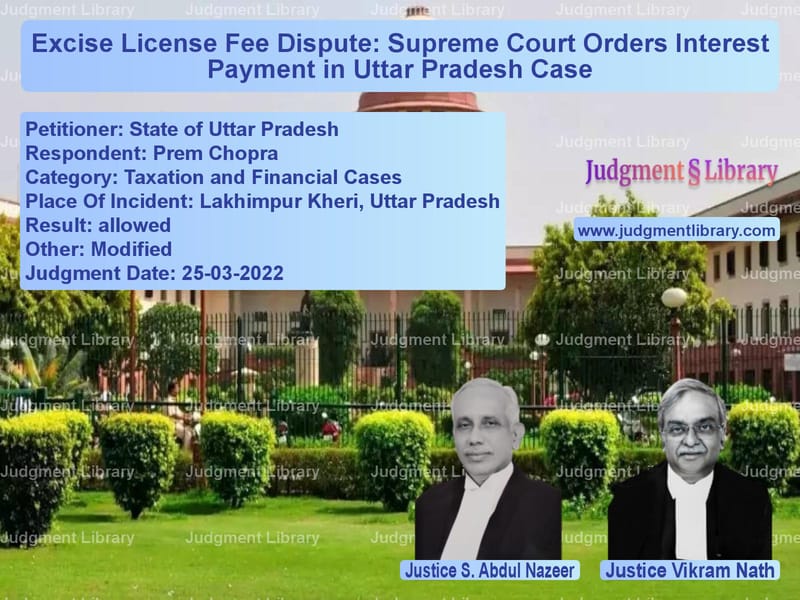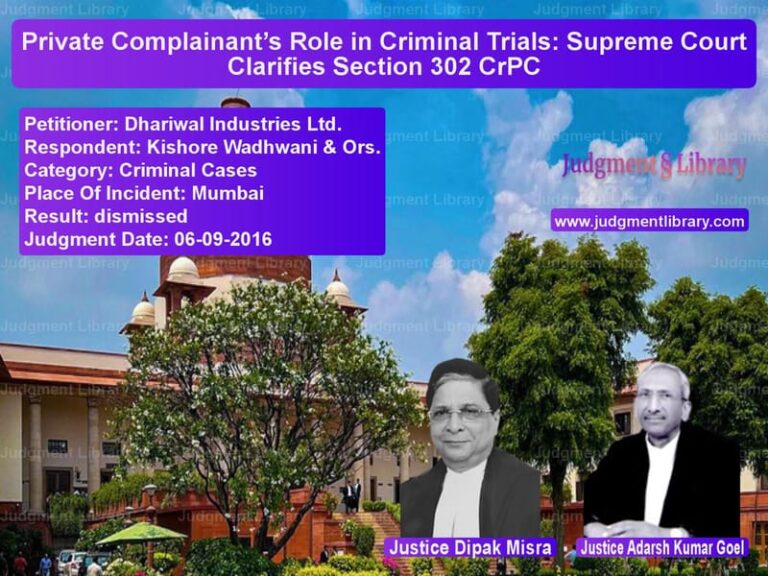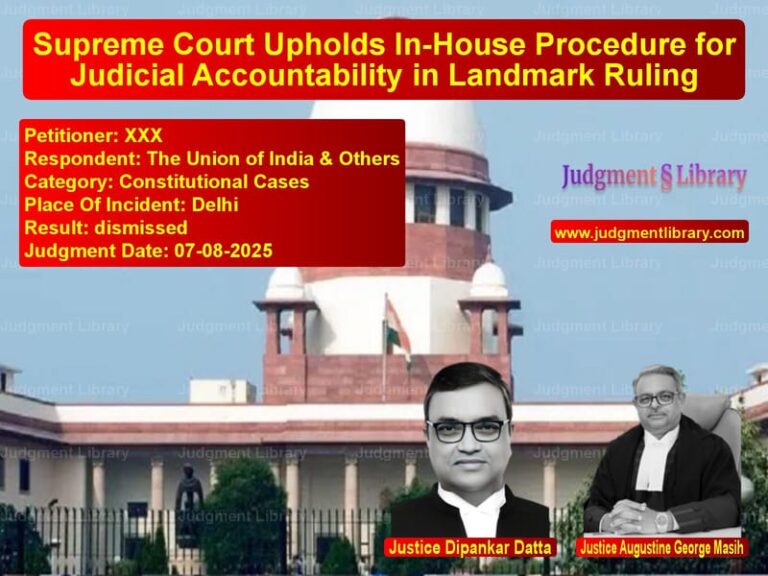Excise License Fee Dispute: Supreme Court Orders Interest Payment in Uttar Pradesh Case
The case of State of Uttar Pradesh vs. Prem Chopra revolves around an excise license fee dispute wherein the respondent, a liquor shop license holder, contested the interest levied on arrears of excise revenue. The Supreme Court examined whether the licensee was liable to pay interest on outstanding dues that remained unpaid during the period covered by a High Court stay order.
The ruling establishes a crucial precedent in taxation and excise laws, emphasizing that a stay order does not erase financial liabilities but merely postpones their enforcement.
Background of the Case
The dispute stemmed from the excise policy announced by the Government of Uttar Pradesh for the year 2002-03. Under this policy, the District Magistrate/Collector, Lakhimpur Kheri, issued an advertisement for granting licenses for the retail sale of country liquor. The respondent, Prem Chopra, applied for a license and was granted the right to operate a liquor shop under the terms of the U.P. Excise (Settlement of License for Retail Sale of Country Liquor) Rules, 2002.
The license was issued for an annual fee of Rs. 29,52,000, covering the period from April 1, 2002, to March 31, 2003. However, in December 2002, the respondent sought to surrender the license, claiming financial difficulties in continuing operations. As per the licensing conditions, he was still liable to pay the full license fee.
By the end of December 2002, the respondent had lifted liquor stock worth Rs. 20,35,212, but the remaining license fee of Rs. 9,16,788 was unpaid. Consequently, the excise department issued notices demanding payment.
Legal Proceedings and High Court Ruling
The respondent challenged the demand for payment and filed Writ Petition No. 855 (MB) of 2003 before the Allahabad High Court (Lucknow Bench). The High Court directed the respondent to file an appeal before the Additional Commissioner of Excise. Subsequently, the excise license was canceled on March 8, 2003.
The Excise Commissioner, on April 23, 2003, dismissed the respondent’s appeal, holding that under Rule 19 and Section 36 of the U.P. Excise Act, 1910, he was liable to pay the outstanding amount. The respondent’s revision petition was also rejected by the Secretary, Excise Department, on July 18, 2003.
After adjusting the security deposit of Rs. 2,95,200, the excise department determined that the respondent still owed Rs. 6,43,562. In response, he filed another writ petition, Misc. Single No. 2582 of 2003, in which the High Court granted an interim stay on recovery, subject to the deposit of Rs. 2,75,000.
The respondent eventually paid the remaining Rs. 3,68,562 in 2017, nearly 14 years after the dues first arose. However, he refused to pay interest, arguing that the High Court’s interim stay had protected him from any additional charges.
On May 10, 2018, the High Court ruled in favor of the respondent, setting aside the excise department’s demand for interest of Rs. 10,08,210.51.
Arguments of the Petitioner (State of Uttar Pradesh)
The State of Uttar Pradesh, through its counsel, argued that:
- The respondent was legally bound to pay the full license fee as per the terms of the settlement.
- The High Court’s stay only prevented immediate enforcement; it did not nullify the respondent’s financial obligations.
- The respondent failed to make timely payments despite losing all legal challenges before the excise authorities.
- As per Section 38-A of the U.P. Excise Act, interest is payable on excise dues that remain unpaid beyond three months.
Arguments of the Respondent (Prem Chopra)
The respondent contended that:
- Since the High Court had granted a stay, he was not liable to pay interest.
- The delay in payment occurred due to pending litigation, not willful default.
- The demand for interest was excessive and unjustified.
Supreme Court’s Observations
The Supreme Court, comprising Justices S. Abdul Nazeer and Vikram Nath, analyzed the matter in light of legal precedents.
The Court made the following key observations:
- A stay order does not erase financial liability. It merely postpones enforcement until the court decides the case.
- Once the writ petition was dismissed for non-prosecution, the interim order ceased to have any effect.
- Under Section 38-A of the U.P. Excise Act, interest is automatically applicable to unpaid dues.
- Legal precedents establish that when a stay order is lifted, the beneficiary must pay any outstanding interest.
Supreme Court’s Verdict
On March 25, 2022, the Supreme Court ruled:
- The High Court’s order exempting the respondent from interest payment was erroneous.
- The respondent was liable to pay Rs. 10,08,210.51 in interest as calculated by the excise department.
- However, the respondent was allowed to apply under the One-Time Settlement Scheme, 2021, which provided concessions for interest payments.
- If the respondent applied under the scheme within eight weeks, his case would be considered on its merits.
The Court concluded:
“In view of the settled legal position, the High Court has erred in holding that the respondent was not liable to pay interest due to the protection given under the interim order.”
Conclusion
This judgment reaffirms that an interim stay does not waive financial obligations. The ruling clarifies that once a stay is lifted or a case is dismissed, any outstanding dues, including interest, become payable.
The Supreme Court’s decision serves as a significant precedent for cases involving excise revenue, taxation, and contractual payments owed to the government.
Petitioner Name: State of Uttar Pradesh.Respondent Name: Prem Chopra.Judgment By: Justice S. Abdul Nazeer, Justice Vikram Nath.Place Of Incident: Lakhimpur Kheri, Uttar Pradesh.Judgment Date: 25-03-2022.
Don’t miss out on the full details! Download the complete judgment in PDF format below and gain valuable insights instantly!
Download Judgment: state-of-uttar-prade-vs-prem-chopra-supreme-court-of-india-judgment-dated-25-03-2022.pdf
Directly Download Judgment: Directly download this Judgment
See all petitions in Tax Refund Disputes
See all petitions in Income Tax Disputes
See all petitions in Banking Regulations
See all petitions in Judgment by S. Abdul Nazeer
See all petitions in Judgment by Vikram Nath
See all petitions in allowed
See all petitions in Modified
See all petitions in supreme court of India judgments March 2022
See all petitions in 2022 judgments
See all posts in Taxation and Financial Cases Category
See all allowed petitions in Taxation and Financial Cases Category
See all Dismissed petitions in Taxation and Financial Cases Category
See all partially allowed petitions in Taxation and Financial Cases Category







